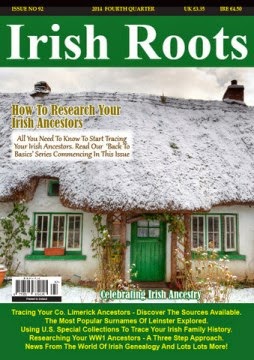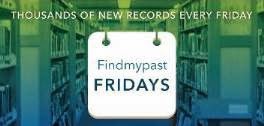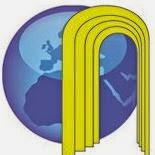Tuesday 18 November: Trapped by the Border: Northern Nationalists and Southern unionists 1910-1925, with Dr Eamon Phoenix. Part of the Lisburn Museum Lecture Series: Ireland during the Great War. Venue: Lisburn Museum, Market Square,
Lisburn, BT28 1AG. 7pm. Free but must be booked in advance – tickets available from museum reception or, for more information call 028 9266 3377.
Tuesday 18 November: The Viking Origins of Limerick City, with John Elliott. Venue: Granary Library, Michael Street,
Limerick. Free. 8pm.
Tuesday 18 November: Galway Women and World War One, with Mary Clancy. Host: Galway's Great Read, Galway Libraries. Venue: Ballinasloe Library, Fairgreen,
Ballinasloe, Co. Galway. 6pm. Free.
Wednesday 19 November:
Galway Women and World War One, with Mary Clancy. Host: Galway's Great Read, Galway Libraries. Venue: Clifden Library, Main Street,
Clifden, Co. Galway. 6pm. Free.
Tuesday 18 November: Irish Research: the ins and outs, with Lisa Dougherty. Venue: Irish American Heritage Museum, 370 Broadway,
Albany, New York 12207. 6:30pm–7:30pm. Free. Need to
register.
Wednesday 19 November: Book launch:
Strokestown and the Great Irish Famine by Ciarán Reilly. To be launched by former Minster and TD Mary O'Rourke. This important new study (see
blogpost from earlier this month) contains more than 150 documents from the Strokestown archive of interest to genealogists. Venue: The Library,
Strokestown House, Co Roscommon. 8pm. All welcome.
Wednesday 19 November: Robert Tressell, Dubliner: author of ‘The Ragged Trousered Philanthropists’, with Bryan MacMahon. (Not genealogy, but included here because it's my all-time favourite book. Ought to be on school curriculum.) Venue: Conference Room, Dublin City Library & Archive, 138-144 Pearse Street,
Dublin 2. 6:30pm. Free.
Wednesday 19 November: The Ordnance Survey now and in the future, with Colin Bray. Part of the Mapping City, Town and Country lecture series. Venue: Royal Irish Academy, 19 Dawson Street,
Dublin 2. 1-2pm. Free. All welcome. No need to book.
Wednesday 19 November: Tracing your Northern Irish ancestors, with Ian Maxwell. Host: North of Ireland Family History Society, North Armagh branch. Venue: Town Hall, Edward Street,
Portadown, Co Armagh. 7:30pm.
Wednesday 19 November: Changed Utterly: the birth of independent Ireland, 1912-1922, with Daniel Mulhall, Irish Ambassador to Great Britain, presenting the inaugural Irish Studies Centre Autumn lecture. Reception follows. Venue: Henry Thomas Room, London Metropolitan University, 166-220 Holloway Road,
London N7 8DB. 6pm–8pm. Free, but need to
reserve place.
Wednesday 19 November: The Battle of Clontarf in Irish history and legend, with Colm Lennon. Host: Dún Laoghaire Borough Historical Society. Venue: Kingston Hotel,
Dún Laoghaire, Co Dublin. 8pm. Admission €3.50 non-members.
Wednesday 19 November: The Ordnance Survey in Ireland – the early years, with Richard Kirwan. Host: Carlow Historical and Archaeological Society. Venue: Talbot Hotel
Carlow. 8:00 pm. Free. All welcome.
Thursday 20 November: Belfast Newspaper Library, with Catherine Morrow. Host: North of Ireland Family History Society, North Down & Ards Branch. Venue: 1st Presbyterian Church Hall, Upper Main Street,
Bangor. 7:30–9:30pm.
Thursday 20 November: The History of Asgard, from Launch to Gun Running to Conservation, with Pat Murphy. Venue: National Maritime Museum,
Dun Laoghaire, Co Dublin. 8pm. €10 tickets at the door.
Thursday 20 November: How to trace WW1 military records, with John Goodman. Venue: Bunclody Library, Millwood, Carrigduff,
Bunclody, Co Wexford. 7pm.
Thursday 20 November: Presbyterian Chaplaincy in the First World War, with Rev Dr Victor Dobbin. Host: Presbyterian History Society of Ireland. Venue: Malone Presbyterian Church, 462 Lisburn Road,
Belfast BT9 6GT. 8pm, followed by refreshments. Also exhbition looking at the church during WW1. Free. All welcome.
Saturday 22 November: Poland and Ireland in WW1 – a history conference and exhibition. Four 45-minute lectures, plus lunch (Polish dish). Host: Discover Poland. Venue: Ballroom, Wynn's Hotel, Lower Abbey Street,
Dublin 1. 10am–3:20pm. Free.
Saturday 22 November: Building Welfare: Building a nation? The case of Richmond Asylum, with Dr Pauline Conroy. Host:
Stoneybatter & Smithfield People's History Project. Venue: Carmichael Centre, North Brunswick Street,
Dublin 7 (next to Richmond Hospital). 4pm. Free, but reserve place by
email.
Tuesday 25 November: Dublin at war, 1914-18, a History Ireland ‘Hedge School’ debate. Venue: National Library of Ireland, Kildare St,
Dublin 2. Chaired by Tommy Graham, editor of History Ireland. Panelists Padraig Yeates, Brian Hanley, Ann Mathews, and David Fitzpatrick. 7pm. Admission free. No need to book.
Tuesday 25 November: Family history resources at Coleraine Library, with Sarah Carson. Host: North of Ireland Family History Society, Coleraine Branch. Venue: Guide Hall, Terrace Row,
Coleraine, Co Derry-Londonderry. 8.00pm. Lecture followed by light refreshments. All welcome. €3 for non-members.
Tuesday 25 November:
Recruitment in the First World War in Kilrush, Co Clare, with Paul O'Brien. Host: Kilrush and District Historical Society. Venue: Teach Ceoil, Grace Street,
Kilrush, Co. Clare. 8pm.
Wednesday 26 November: Irish Volunteers and National Volunteers in Meath, October 1914-April 1916, a Decade of Centenaries lecture, with Ruth Illingworth. Hosts: Meath Archaeological & Historical Society. Venue: St Mary's Church of Ireland Hall,
Navan. 7.30pm.
Thursday 27 November: What really happened at the Battle of Clontarf, with Professor Seán Duffy. Host: The Friends of the Library – Trinity College Dublin. Venue: Thomas Davis Theatre, Arts Building, Trinity College
Dublin. 7:30pm. Admission €5/Members & Concessions €2.50. All welcome.
Thursday 27 November: A street through time, featuring Market Street, with Johnnie Kennedy. Host: Strabane History Society. Venue: Room 5, Strabane Library, 1 Railway Street,
Strabane, Co Tyrone BT82 8EF. 7:30pm
Thursday 27 November: From Mons to Gallipoli – Irish soldiers at war in the first 9 months of WW1, with Lar Joye. Host: Royal Society of Antiquaries of Ireland. Venue: 63 Merrion Square South,
Dublin 2. 7:30pm. Free.
Thursday 27 November: Graveyard research in North Antrim, with Dorothy Arthur. Host: North of Ireland Family History Society, Ballymena branch. Venue: Michelin Arts Workshop, Braid Arts Centre 1-29 Bridge Street,
Ballymena BT43 5EJ, Co Antrim. 7:15pm.
Saturday 29 November: Dublin in the rare auld rhymes, a night of song, story and recitations. Host: Stoneybatter and Smithfield People's History Project. Venue: The Cobblestone pub,
77 King St North, Dublin 7. Donation to Capuchin Day Centre at the door. 8pm.



























